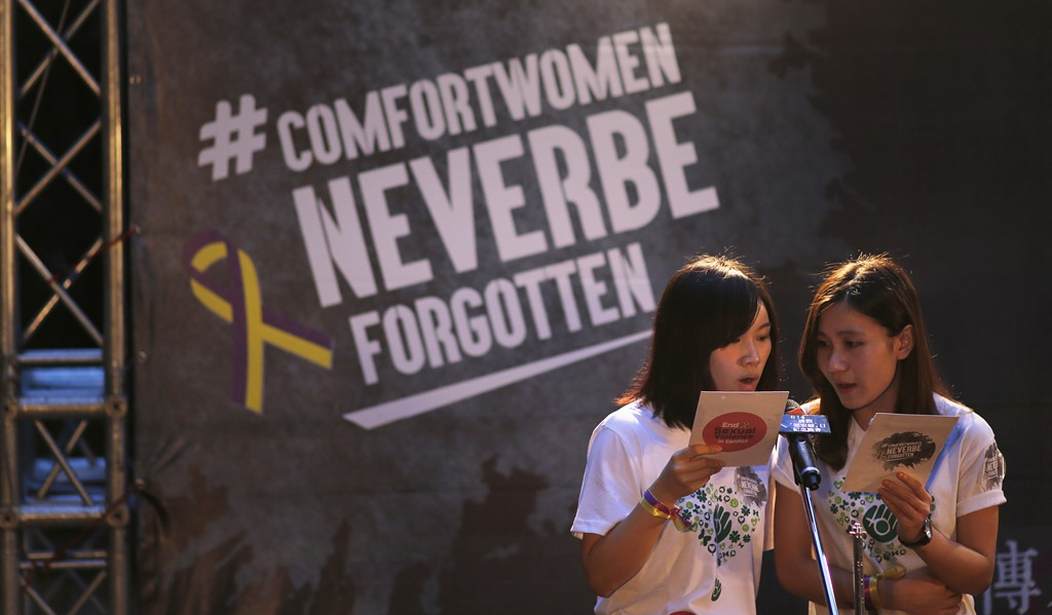Donald Trump got in a lot of trouble during the campaign when he went after John McCain’s war record.
“He’s not a war hero,” Trump said of McCain, the Republican senator from Arizona who spent six years in the infamous Hanoi Hilton prisoner of war camp during the Vietnam War. “He is a war hero because he was captured. I like people that weren’t captured, OK?”
The remark generated outrage on both sides of the political divide. But it did raise questions about who we consider heroes and how we honor people whose only encounter with the limelight was to be a victim.
Statues of Civil War leaders, such as Robert E. Lee, are coming down in New Orleans and elsewhere because of sensitivity to victims. There is still a movement – and considerable confusion – to honor the victims of 9/11.
And now, in the suburbs of Atlanta, a dispute about whether to place a statue honoring the so-called comfort women of World War II has generated similar controversy.
Mostly Korean, comfort women were dragooned in various ways by the Japanese army from the early 1930s until the end of World War II and forced to serve as prostitutes for the soldiers. The Japanese saw a strategic advantage in supplying women to its soldiers so they would not rape and pillage, which earned the ire of the conquered and increased risks to troops.
In all, as many as 200,000 women may have been forced to serve as sex slaves in this way. Since the war ended in 1945, the issue has been a source of discord between Tokyo and Seoul. In 2015, the two countries reached an agreement in which Japan paid about $8.7 million into a fund to assist victims, and the two countries agreed not to criticize each other over this in international forums.
But activists for the comfort women say that’s not enough – that Japan should do more to apologize and help victims. And Moon Jae-in, South Korea’s new president, told Japanese prime minster Shinzo Abe within the last month that “the reality is the majority of our people cannot emotionally accept the comfort women agreement.”
Recommended
And now – as if America does not have enough to argue about – the dispute has come to Brookhaven, Ga. The town has agreed to be the site of a statue of a comfort woman seated next to an empty chair.
The statue is similar to one in the Korean city of Busan, which drew a rebuke and recall of diplomats by the Japanese when it appeared. Such statues also are found in Palisades Park and Union City, N.J., Southfield, Mich., Glendale, Calif., and Fairfax County, Ga., -- all communities with strong Korean populations that have pressured leaders to erect the statues.
Brookhaven stepped up when the Center for Civil and Human Rights, an Atlanta museum, turned down the statue after first agreeing to it. The center said the statue was not consistent with its design, but advocates of placing the statue charge the museum caved to political pressure from the Japanese.
This is an odd and sad case. The comfort women were victims of some of the worst human trafficking crimes ever perpetrated. Only about 40 remain alive today. But the question is – or should be – how does this make things better?
If it is understanding those who champion this want, it’s hard to see how they get it erecting what will be a controversial statue in a public park in a small suburb of Atlanta. The controversy doesn’t even involve Americans directly, but as anyone who has lived through a war will attest, war causes tremendous damage wherever it’s fought.
No one questions that women have been victimized in this way by war since the dawn of time. No one would question a monument to the suffering of women at the hands of soldiers during wartime or research into how this came to be and what it meant to the people involved.
But the governments of South Korea and Japan have put in a lot of work to bring closure to this issue. The remarks by President Moon show just how far they still have to go, but they also indicate the process has begun.
What moves that process forward? Reminders all over the world of the evil of several generations ago and how some still believe these sins have not been atoned? Or a more forward-looking approach that does not provoke but does lead to understanding, study, reform and, ultimately, reconciliation?
Will it be the end of the world if this statue goes up in the suburbs of Atlanta? No, it won’t. But will it be a step toward bringing together these communities and healing these wounds? It’s hard to argue that it would. And given today’s political climate, do we really need more to disagree about?

























Join the conversation as a VIP Member